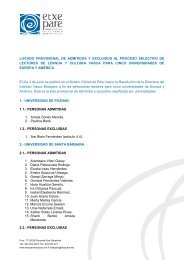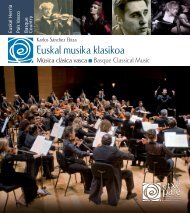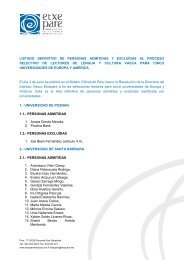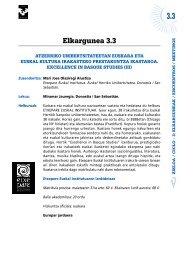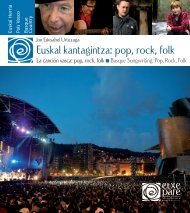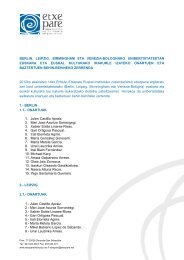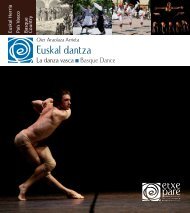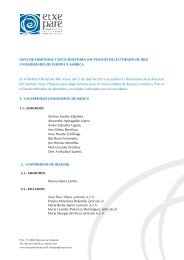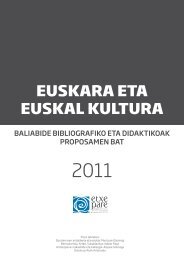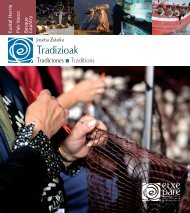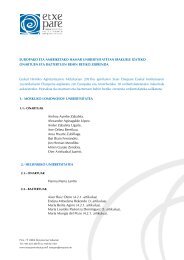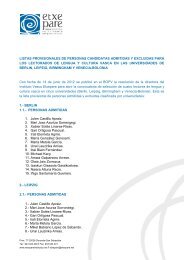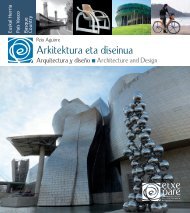Euskal sukaldaritzaz - Etxepare, Euskal Institutua
Euskal sukaldaritzaz - Etxepare, Euskal Institutua
Euskal sukaldaritzaz - Etxepare, Euskal Institutua
You also want an ePaper? Increase the reach of your titles
YUMPU automatically turns print PDFs into web optimized ePapers that Google loves.
contractuales que se conocen para la pesca y manipulación<br />
del bacalao en su aguas. Así que nuestro<br />
pasado glorioso, lo erigieron pobres pescadores ateridos<br />
de frío, con la pesca de gádidos que salaban<br />
con sal importada que pagaban como mejor podían.<br />
A duras penas, seguramente.<br />
Mientras todo eso sucedía, en Amsterdam, por ejemplo,<br />
discutían en el adelantado edificio de la bolsa la<br />
cotización de los productos exóticos, o en otras naciones<br />
erigían monumentos a ilustres navegantes o<br />
comerciantes que se especializaron e hicieron fortuna<br />
con el tráfico de especias. Nosotros no tuvimos<br />
nada de eso, a lo sumo cantábamos las hazañas marineras<br />
de dos tripulaciones de traineras rivales, que<br />
luchaban entre sí para clavar el primer arpón a una<br />
ballena que llegó a nuestra costa. 2<br />
Pero todo cambia y en estos días tampoco parece ser<br />
que la industria bacaladera, como antaño la ballenera,<br />
se encuentre en su mejor momento, con los tradicionales<br />
bancos de Terranova esquilmados y con severas<br />
restricciones, sobre todo desde 1996. Y eso que<br />
el bacalao es tan voraz como fecundo: cada hembra<br />
es capaz de poner hasta casi diez millones de huevos.<br />
Parece mentira la de bacalao que hemos tenido que<br />
comer en diez siglos, para hacerlo casi desaparecer<br />
en ese tiempo, ya que fue hacia el año mil de nuestra<br />
era, cuando los marinos que perseguían a la ballena<br />
llegaron hasta Terranova y vieron aquellas aguas infestadas<br />
de este pez. En época de desove, el bacalao<br />
necesita aguas ricas en plancton y suele ir a las costas<br />
de Noruega, Dinamarca, Irlanda, Norte de Escocia y,<br />
sobre todo, Terranova.<br />
Allá solían andar también las ballenas persiguiendo krill<br />
y fue donde los marinos vascos, encontraron bancos<br />
de bacalao, siglos antes de que Leif Erikson o Cristobal<br />
Colón tocaran costa transatlántica con sus naves. ¿Que<br />
por qué nadie conocía este hecho y no sale en los libros<br />
de historia? Por la misma razón que a nadie gusta hacer<br />
propaganda del lugar donde encuentra setas en primavera.<br />
Los buenos negocios –y el del bacalao fue duran-<br />
handle cod in their waters. Therefore our glorious<br />
past was established by humble fishermen stiff with<br />
cold fishing gadidae which they salted with imported<br />
salt that they paid for as best they could. Undoubtedly<br />
with great difficulty.<br />
Whilst all this was going on, in Amsterdam, for example,<br />
there was a debate in the pioneering Stock<br />
Exchange over the exchange rates for exotic products,<br />
and in other nations monuments were built to<br />
illustrious navigators or merchants who specialized<br />
in and made a fortune out of the spice trade. We had<br />
nothing like this. At most, we sang about the seafaring<br />
exploits of rival rowing crews who battled one<br />
another to strike the first harpoon into a whale that<br />
had been sighted on our coast. 2<br />
But everything changes and nowadays it does not<br />
seem like the cod industry, as was the case long ago<br />
with whaling, is all that healthy, with the traditional<br />
banks off Newfoundland depleted or severely restricted,<br />
especially since 1996. And the cod is as voracious<br />
as it is fertile: each female can lay up to ten<br />
million eggs.<br />
It’s unbelievable how much cod we’ve been eating<br />
for a thousand years and that it has now almost<br />
disappeared, given that it was only around 1000<br />
AD when seafarers pursuing whales arrived in Newfoundland<br />
to find those waters infested with this<br />
fish. During spawning, cod need plankton-rich waters<br />
and usually go to the coasts of Norway, Denmark,<br />
Ireland, northern Scotland and, especially,<br />
Newfoundland.<br />
Whales, too, head for these areas in search of krill,<br />
and it was here that Basque sailors discovered cod<br />
banks, centuries before Leif Eriksson or Christopher<br />
Columbus crossed the Atlantic in their vessels. Why<br />
did no one know about this and why was it not mentioned<br />
in history books? For the same reason that no<br />
one likes to make public the best places to find mushrooms<br />
in September. Good business –and that of cod<br />
was for centuries among the best– is best done on<br />
11



